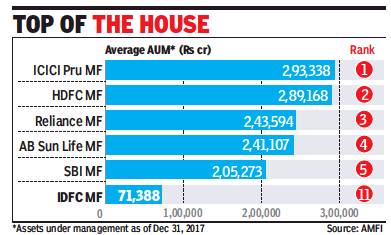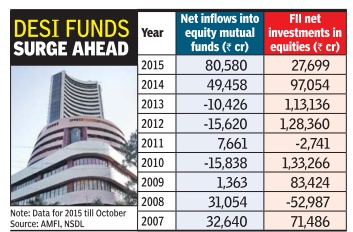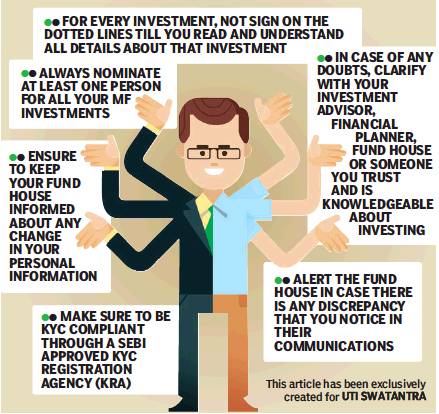Mutual Funds: India
This is a collection of articles archived for the excellence of their content. |
Contents |
Asset management
2018: IDFC looks to exit Asset management

From: Boby Kurian, Mayur Shetty & Partha Sinha, IDFC looks to exit asset mgmt biz in ₹4,000cr deal, March 22, 2018: The Times of India
Move Part Of Strategy To Unlock Value For Shareholders
IDFC has begun discussions with IndusInd Bank and Citic CLSA, among others, to merge or sell its asset management company (AMC) — which manages about $11 billion, or Rs 71,000 crore — as part of value-unlocking moves for shareholders, multiple sources familiar with the matter said.
The Hong Kong-based financial services behemoth Citic CLSA and buyout private equity firms like Apax Partners too have evinced early interest to pursue a deal-making. IDFC is expected to ask for a Rs 4,000-crore payout — almost 6% of the assets under management — as the deal valuation. A fourth of the AMC’s assets under management are equity, while the rest are in debt. These exploratory talks would gain momentum only after IDFC allows potential bidders to conduct due diligence, sources added.
A senior official recently told this newspaper that IDFC could explore value-unlocking moves for the AMC business. “This could be either through a merger or a partnership deal,” he had said without divulging details. IDFC, which controls IDFC Bank through a nonoperating financial holding company, has a beaten down market value of Rs 7,900 crore, or $1.2 billion.
When contacted, an IDFC spokesperson said the company would not comment on speculative queries. IndusInd said that it “denies this market speculation”.
IDFC is in the midst of a merger process with Capital First, a non-banking finance company. In January, the private bank agreed to acquire Capital First in a share-swap deal valued at about $1.5 billion as part of efforts to boost retail loans.
IndusInd, originally promoted by the Hindujas and the first private bank to get a licence in post-liberalised India, is on the lookout to build a full suite of financial services. “Asset management is an ROE (return on equity) business they are interested in at a reasonable valuation,” one of the sources cited earlier said. CLSA has been interested in India’s expanding asset management industry with low penetration and expected to benefit from an increasingly digital economy.
Average assets under management (AAUM) of the Indian mutual fund industry stood at over Rs 23 lakh crore in February this year. Domestic mutual funds have reported a fourfold rise from just Rs 5 lakh crore a decade ago. IDFC Asset Management Company was established in the year 2008 after IDFC bought StanChart Asset Management for Rs 820 crore (paying 5.6% of the value of assets under management). StanChart had got the mutual fund subsidiary as part of its deal to acquire ANZ Grindlay’s Bank in 2000.
The value-unlocking moves should also be seen in the context of some IDFC shareholders being unhappy with the lackadaisical share price, which they believe is trading at more than 50% discount to its intrinsic fair value. The stock closed at Rs 50 apiece in Mumbai trade.
Investment(s) by Mutual Funds
2015: Equity MFs beat FIIs

The Times of India, November 20, 2015
Allirajan M
Equity MF investors beat FIIs in 2015
For years, equity mutual funds (MFs) were the poor cousins of the stock markets as foreign institutional investors (FIIs) always poured more money into direct equities. But for the first time ever, equity MF investors are overshadowing their overseas peers, having pumped nearly three times more funds into equity schemes in the current year than FIIs. Equity MFs (including equity-linked savings schemes, or ELSS) have seen net inflows of Rs 80,580 crore, or about $12.5 billion, so far in 2015 (till October) -the highest on record. In contrast, FIIs have made net investments of Rs 27,699 crore, or around $4.25 billion, during the period.
In fact, net investments made by MF investors have al ready surpassed the highs hit in 2014. The surge in inflows into equity schemes has prompted fund houses to deploy money in shares in a big way .Equity MFs have deployed about $950 million per month on an average in 2015. Fund deployments peaked to an all-time monthly high in August af ter the stock markets plunged in the wake of the global turmoil in equity markets amid a sharp selloff in China.
“Investors are gradually realizing that equities are the best option on a tax-adjusted basis over the long term. So they are putting a bigger portion of their savings in equiti es,“ says Sunil Singhania, head (equities), Reliance Capital Asset Management.
Gopal Agrawal, CIO, Mirae Asset Global Investments India, says, “Interest (in equities) has been quite consistent among investors. Other asset classes such as gold and real estate have not done well and this has also helped. There is a clear shift in investment patterns. Investors have become a lot more mature. The attractiveness of other asset classes has diminished to a large extent. But the long-term outlook is quite positive for equities.“
Barring odd instances such as the market meltdown in 2008 when the rout that followed the global financial crisis triggered a massive pullout by FIIs, overseas investors have stood head and shoulders above their domestic peers in investments into Indian stocks.
CEO remunerations
2017: UTI leads
The Unit Trust of India (UTI), the original pioneer of mutual funds (MFs) in the country , may have lost its leadership position to private sector peers. But the fund house's top honcho and its employees are now the best paid in the MF industry.
Leo Puri, MD and CEO of UTI MF , was the highest paid executive in the MF industry in 2016-17. He took home Rs 7.07 crore as annual salary (fixed and variable pay) during the year, a 23% increase compared with the previous fiscal, pipping Milind Barve, the MD and CEO at HDFC MF , the highest paid executive in 2015-16.
The median remuneration at UTI -which stood at Rs 19.6 lakh during the year, more than twice the average pay of employees at the country's top-4 fund houses by assets under management (AUM) -is high as the average tenure of employees is more than 20 years. Incidentally, UTI is only the sixth largest fund house by AUM, and lost its place in the top-5 league to SBI MF in April last year. Kamlesh Dangi, group president & head HR , UTI MF , said, “Since we do not have a long-term incentive plan, the salary (cash) component is high.“
While the median remuneration of employees at ICICI Prudential MF -the largest fund house by AUM -was Rs 5.84 lakh, employees at HDFC MF , the second largest fund manager got Rs 8.77 lakh as average pay . Employees at Reliance MF and Birla Sun Life MF , the third and fourth largest fund houses respectively , got an average pay of around Rs 8.5 lakh and Rs 7 lakh respectively .
More than a dozen executives at UTI were paid in excess of Rs 1 crore in 2016-17. Sundeep Sikka, the executive director and CEO of Reliance MF , got the highest pay rise among executives of top-6 fund houses in the country . Sikka earned Rs 5.01 crore as annual salary (fixed and variable pay) during 2016-17, a 43.1% jump on a yearon-year basis. In addition, he also got a one-time payment of Rs 3.41crore for the year.
Despite the stellar show by equity MFs, which touched record highs, soaring past the Rs 5-lakh-crore AUM mark in 201617, the top-2 equity fund managers saw negligible hike in their annual pay . While Sankaran Naren, the ED of ICICI Prudential MF , who also heads the fund house's equities team, saw no change in remuneration during the year, the annual pay of Prashant Jain, ED of HDFC MF , who dons a similar role, inched up by 3.9%.
The annual salary of Jain, however, remained the highest in the industry among fund managers. Incidentally , HDFC MF's average AUM in the equity category increased 18.4% yo-y to Rs 80,592 crore while ICICI Prudential's average AUM surged 33% y-o-y to Rs 77,223 crore for 2016-17. MFs would not disclose the remuneration paid to its star fund managers earlier. They would disclose compensation paid to key managerial personnel (KMP), which included the MD. Interestingly , KMP included the MD and CEO, CFO and company secretary and not CIOs who run the fund management business.
Investors’ rights and duties
As in 2018
January 23, 2018: The Times of India
Every MF investor has certain rights and some duties to facilitate a smooth investing experience
Mutual fund investors enjoy several rights under current laws. For a smooth investing experience the investor should also fulfil certain duties that will make him/her a responsible investor. Here are some of the important tools that all mutual fund investors should keep in mind.
KYC COMPLIANCE
Under current laws, Know Your Client (KYC) compliance is compulsory for every mutual fund investor. KYC is done mainly to prohibit money laundering and to stop illegal money from getting into the fund industry. In turn such slush money could also percolate into the stock, debt and gold markets.
For KYC compliance, the investor should provide a valid proof of identity (Passport, PAN, voter ID etc.), proof of address, passport photo and PAN. The government has now also made it compulsory to link Aadhaar to all KYC compliance requirement.
Currently, once an investor updates his KYC information with a KYC Registration Agencies (KRA), the same will automatically get updated in the investments he/she has with all the entities regulated by Sebi.
PERSONAL INFORMATION
Every MF investor should update all their relevant personal information__ address for correspondence, contact number(s), email ID, income tax PAN, at least one bank account number that will be used for all fund-related transactions__with the fund houses where they have investments. The bank account details will include the 11-16 digit account number, 11-digit IFSC and 9-digit MICR numbers. In case of any change in personal information, it’s the duty of the investor to inform the fund house as early as possible. Among others, updated personal information helps fund houses to prevent frauds related to investments.
NOMINATION FACILITY
Current rules require that every fund investor should make at least one nomination for each of his/her investments. Alternately, the investor has to declare that he/she doesn’t want to nominate anyone. Nominations turn helpful in case of any eventuality of the investor.
WATCH YOUR INVESTMENTS
Every responsible investor should keep a tab on how his/her funds are performing by watching their funds’ NAVs on a regular basis. However, the regularity should not be too frequent like every day or week which could be detrimental to his/her investment and the long term financial plan. Reviewing investments on a regular basis is important because this makes the investor aware of the market trend and he/she could go for a course correction in case the investments do not perform as planned.
HAVE A FINANCIAL PLAN IN PLACE
One of the first things an investor should remember is that financial planning is never for an individual. It’s for the family. The process of financial planning involves a series of decisions relating to your family’s future financial goals, investments in and buying of financial products, and executing the same.
Some of the important elements of financial planning are goal setting, identifying needs and wants of the family and also of the individuals, keeping tab of income, expenses and savings of the people in the family, creation of an emergency fund, taking adequate insurance, investments for short, medium and long term goals and finally reviewing and if needed rebalancing the portfolio.
AADHAAR AND FATCA COMPLIANCE
Lately the government has made it compulsory for all investors to link their Aadhaar numbers to all investments. It has also asked every investor to comply with Foreign Account Tax Compliance Act (FATCA).
Duties of a responsible investor

From: January 23, 2018: The Times of India
See graphic:
Duties of a responsible investor
See also
Sensex <> The stock market: India <> Mutual Funds: India <> Rupee: India <> Chief Executive Officers: India